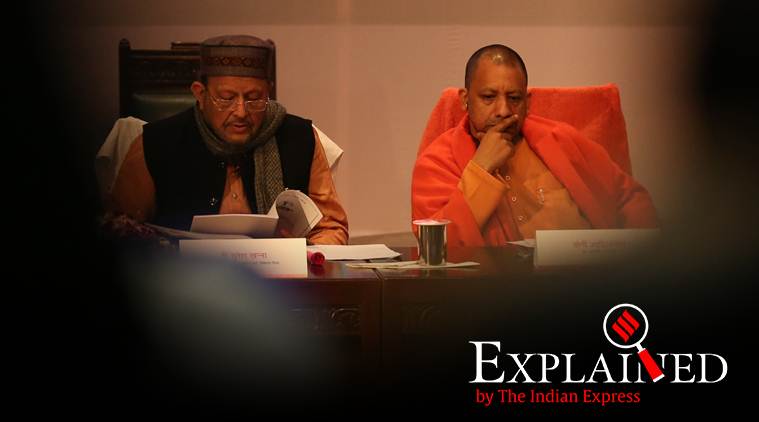- India
- International
Explained: What is a police commissionerate system?
Previously, only four cities had the commissionerate system of policing: Kolkata, Mumbai, Hyderabad and Chennai. Now, it will be implemented in Lucknow and Noida.
 The system gives more responsibilities, including magisterial powers, to IPS officers of Inspector General of Police (IG) rank posted as commissioners. (Express File Photo: Vishal Srivastav)
The system gives more responsibilities, including magisterial powers, to IPS officers of Inspector General of Police (IG) rank posted as commissioners. (Express File Photo: Vishal Srivastav)
The Uttar Pradesh Cabinet on Monday approved the commissionerate system of policing for state capital Lucknow, and Noida. The system gives more responsibilities, including magisterial powers, to IPS officers of Inspector General of Police (IG) rank posted as commissioners. Depending on its success here, the policing system may gradually be implemented in other districts as well.
Explained: What is police commissionerate system?
Under the 7th Schedule of the Constitution, ‘Police’ is under the State list, meaning individual states typically legislate and exercise control over this subject. In the arrangement in force at the district level, a ‘dual system’ of control exists, in which the Superintendent of Police (SP) has to work with the District Magistrate (DM) for supervising police administration.
At the metropolitan level, many states have replaced the dual system with the commissionerate system, as it is supposed to allow for faster decision-making to solve complex urban-centric issues.
In the commissionerate system, the Commissioner of Police (CP) is the head of a unified police command structure, is responsible for the force in the city, and is accountable to the state government. The office also has magisterial powers, including those related to regulation, control, and licensing.
The CP is drawn from the Deputy Inspector General rank or above, and is assisted by Special/Joint/Additional/Deputy Commissioners.
How many states have it?

Almost all states barring Bihar, Madhya Pradesh, UT of J&K, and some Northeastern states have a commissionerate system. The British brought the system first in Kolkata and followed it in Mumbai and Chennai presidencies. Delhi turned into a commissionerate during the Morarji Desai regime. In 1978, an initiative to introduce the system in UP, beginning with Kanpur, never materialised.
Prakash Singh says the delay in UP was due to resistance from the IAS lobby. “Bureaucracy in India has resisted it (commissionerate system) tooth an nail. Even in 1978, it was resisted by Delhi bureaucracy,” Singh said. He added that even now in UP, the bureaucracy has wrenched some powers off the commissionerate. “Only 15 Acts have been kept under police commissionerates. Bureaucracy has kept with itself issues of licensing, the Arms Act, Excise laws etc with themselves,” Singh said.
UP Chief Minister Yogi Adityanath has said that as per the Police Act, the system is to be implemented in cities with more than 10 lakh population and added, “But because of lack of political will it could not be implemented. For years, there was a demand in Uttar Pradesh but it was neglected.”
How well policing improves depends on the leadership the government gives to a commissionerate. “Commissionerate system only gives police an enabling environment to delivering policing in a complex region. Ultimately, the officer in charge and the culture he ushers will matter. What will matter the most is how the government deals with him,” said Singh.
What is different under the system?
Policing is based on the Police Act of 1861. Under the colonial system, the overall in-charge of a district or region was the district collector; the SP reported to him. The powers of the executive magistrate, such as issuing orders for preventive arrests or imposition of Section 144 CrPC, were vested in the district collector. This was called the dual system of police administration.
“The primary objective of the British was revenue collection in rural India. They needed a force that could support this objective and unleash tyranny and oppression when needed to suit the objective. The worst of officers from the British police were sent to India. So there was need to put them under the District Collector. That system continued post-Independence,” former UP DG Prakash Singh said.
Under the commissionerate system, the commissioner does not report to the DM. In Mumbai and Delhi, he reports directly to the government. “It gives an integrated command structure. It helps fix responsibility with the Commissioner and eliminates blame game between civil administration and police when something goes wrong,” Singh said.
Don’t miss from Explained | Cricketing miserliness recalled: 56 years ago, Bapu Nadkarni’s 21 maidens on the trot
More Explained
Must Read
EXPRESS OPINION
Apr 23: Latest News
- 01
- 02
- 03
- 04
- 05






































